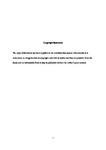The role of counterfactual thinking in deceptive communication
| dc.contributor.supervisor | Clare, Walsh | |
| dc.contributor.author | Briazu, Raluca Andra | |
| dc.contributor.other | Faculty of Health | en_US |
| dc.date.accessioned | 2018-02-12T15:58:04Z | |
| dc.date.issued | 2018 | |
| dc.identifier | 10142935 | en_US |
| dc.identifier.uri | http://hdl.handle.net/10026.1/10765 | |
| dc.description.abstract |
This thesis explores the proposal that there is a close link between counterfactual thinking and lying. Although both require the imagination of alternatives to reality, research has yet to establish a direct link. In the first seven studies the relationship between counterfactuals and lies is directly investigated using novel scenario-based and behavioural tasks. In a further four studies we also investigate the role of affect and executive functions as explanatory mechanisms. Results show that individuals with a tendency to think counterfactually are more likely to generate potential lies and to be more successful when lying in front of others (Study 1 and 6). Furthermore, we also show that counterfactual availability influences people’s tendency to come up with lies (Studies 2, and 3) and the extent to which they expect others to lie (Studies 4, and 5). We also find that the saliency of counterfactual alternatives can affect people’s moral standards by motivating them to lie (Study 7). Based on these results we argue that counterfactuals motivate lying by providing information about how things could have been different. We however also investigate alternative explanations. In Studies 8, 9 and 10 we seek to understand whether counterfactually derived affect might also underlie the relationship, but find no such link. Additionally, in Study 11 we investigate the relationship in Parkinson’s disease participants in order to understand if executive function might be an underlying mechanism. We do not find this to be the case and we show that PD patients are able to engage in counterfactual thinking and also lie. The findings in this thesis are the first to provide a direct link between counterfactual thoughts and lies. Overall, we show how counterfactuals can help us mislead others and we reveal that counterfactual thinking is an important cognitive process in deception | en_US |
| dc.language.iso | en | |
| dc.publisher | University of Plymouth | |
| dc.rights | Attribution-NonCommercial-NoDerivs 3.0 United States | * |
| dc.rights.uri | http://creativecommons.org/licenses/by-nc-nd/3.0/us/ | * |
| dc.subject | Counterfactual thinking | en_US |
| dc.subject | Deception | en_US |
| dc.subject | Lies | en_US |
| dc.subject | Executive function | en_US |
| dc.subject | Parkinson's disease | en_US |
| dc.subject | Affect | en_US |
| dc.subject.classification | PhD | en_US |
| dc.title | The role of counterfactual thinking in deceptive communication | en_US |
| dc.type | Thesis | |
| plymouth.version | publishable | en_US |
| dc.identifier.doi | http://dx.doi.org/10.24382/565 | |
| dc.rights.embargodate | 2019-02-12T15:58:04Z | |
| dc.rights.embargoperiod | 12 months | en_US |
| dc.type.qualification | Doctorate | en_US |
| rioxxterms.funder | Plymouth University | en_US |
| rioxxterms.identifier.project | Cognovo | en_US |
| rioxxterms.version | NA |
Files in this item
This item appears in the following Collection(s)
-
01 Research Theses Main Collection
Research Theses Main



